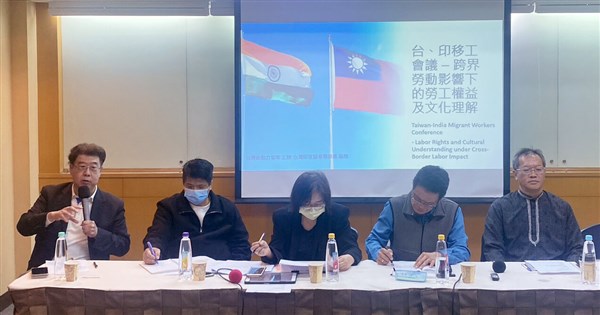Taipei, March 21 (CNA) A scholar Thursday called on Taiwan’s central government and higher education institutions to be better prepared for Indian migrant workers.
Taiwan and India on Feb. 15 signed a memorandum of understanding (MOU) signaling a willingness to make India a source of migrant workers in Taiwan, the Ministry of Labor (MOL) said.
However, critics of the deal have said that it will lead to long-term wage stagnation, as well as endanger women in Taiwan due to, in the words of one protest group, “significant differences” in gender perspectives.
At a seminar on the issue, Fang Tien-sze (方天賜), head of the Taiwan Association for India Studies and the deputy head of National Tsinghua University’s Center for India, said such “discriminatory” attitudes were due to a lack of public understanding.
This is in part because none of Taiwan’s hundreds of higher education institutes have a dedicated India studies department, Fang said.
In addition, there are currently no direct flights between Taiwan and New Delhi, which will prove to be a major obstacle once Taiwan opens its door to Indian migrant workers, Fang said.
Fang said Taiwan should seek to “rise with the Indian giant,” describing the country as one of the world’s leading economies with a huge demographic dividend.
This should include better preparation from the government to open Taiwan’s doors to Indian workers through cultivating interpreters, for example, Fang said.
Meanwhile, speaking during the same seminar, Debjani Ghosh, president of the India-based National Association of Software & Services Companies, said Taiwan is world-renowned for its “supremacy” in semiconductor development.
However, like most countries around the world, Taiwan is also facing growing talent shortages, including 22,000 unfulfilled engineer positions.
India, on the other hand, is the only country projected to have a surplus of million skilled professionals in technology by 2030, she said.
India also has around 37 million graduates, 11 million of whom studied STEM subjects, according to Ghosh.
With its robust and diverse talent pool and great working ethics, India has much to offer Taiwan, particularly in addressing its talent shortage, she added.
In response to the concerns raised by some Taiwanese about Indian workers, Hu Hsin-yeh (胡欣野), a senior officer from the Ministry of Labor’s Workforce Development Agency, said during Thursday’s seminar that the planned introduction of Indian migrant workers is meant to help tackle the labor shortage in Taiwan.
Currently, there are over 18 million Indian migrant workers employed around the world, namely, in Germany, Italy, Israel, Japan and South Korea, and all of these countries have favorable impressions, according to Hu.
Also, all migrant workers will have to provide proof of not having a criminal record before they are hired to work in Taiwan, she said.
Statistically, the crime rate for migrant workers in Taiwan is only around half the national average, Hu said.
On when the first batch of Indian migrant workers might arrive in Taiwan, Hu said that following the MOU signing, both governments need to first hold a round of working group-level meetings to delve into the details of the project.
Hu added that there is currently no timetable for holding the first working group-level meeting.
According to MOL data, there were approximately 750,000 migrant workers in Taiwan as of the end of September, with the majority coming from Indonesia (267,194), ahead of Vietnam (261,301) and the Philippines (152,026).



